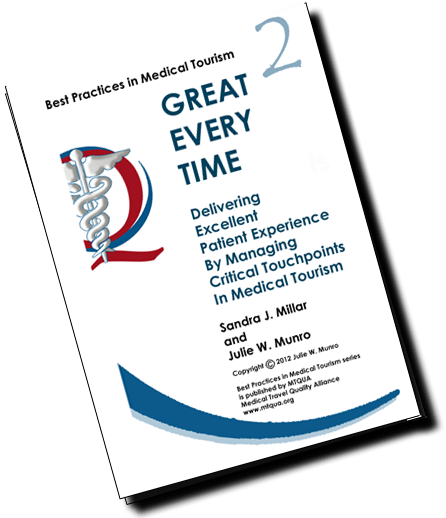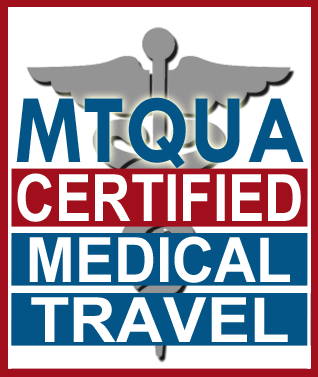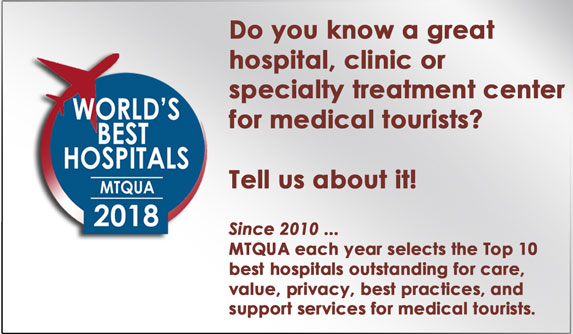
Get the best care and best value in medical tourism for medical procedures
How to get the best care and best value in medical tourism
Patients looking for medical care abroad need accurate up-to-date and reliable information. Medical tourists have a world of choice in health care and are taking advantage of this. But the information they have to base their choices on is often bewildering, confusing, and wrong.
Some patients now consider accreditation status and word of mouth recommendations before they make their choice of hospital, and that’s a definite improvement over relying only on the internet for information or choosing the lowest cost.
Issues such as patient safety and security, international patient operations and protocols, marketing integrity, transparency and facilitator review must be weighed heavily in any selection of hospital by the medical traveler.
To get the best value and care from going abroad for treatment to the top hospitals or other hospitals in known medical destinations, MTQUA recommends that medical tourists consider using a qualified medical travel facilitator or care manager who has professional trained staff on site to take care of any circumstances that may arise, medical or otherwise.
Training and certification in medical tourism
Can your medical facility or medical travel company become a quality provider of treatment care for medical tourists?
Many hospitals and clinics will use a smile, “customer service” and good intentions to hide the fact they have poor or no training of service and professional staff about the different care that medical tourists or expat local patients need.
They often turn to “customer service” agents who offer medical tourists a welcoming smile, an airport pick up, an international menu selection in place of services related to treatment quality, patient safety, transparency, cost containment and other unique differences in treating and caring for traveling international patients, or medical tourists.
Medical tourists have different needs than local patients
At the heart of appropriate care for medical travelers is a need for institutional awareness of the unique differences between local patients and medical tourists. Having a better understanding of what medical tourists, their care managers and home-based doctors expect from the receiving hospital or clinic at the medical destination will lead to better quality of patient care for medical travelers.
 Touchpoints – where patients and providers interact – affect both clinical tasks and patient outcomes. Touchpoints determine the total patient experience and level of satisfaction. Read this 25-page report for practical guidelines and useful suggestions in 11 critical areas where patients and providers meet – and sometimes clash. Download GREAT EVERY TIME: Delivering Excellent Patient Experience By Managing Critical Touchpoints In Medical Tourism, a Best Practices in Medical Tourism report from MTQUA.
Touchpoints – where patients and providers interact – affect both clinical tasks and patient outcomes. Touchpoints determine the total patient experience and level of satisfaction. Read this 25-page report for practical guidelines and useful suggestions in 11 critical areas where patients and providers meet – and sometimes clash. Download GREAT EVERY TIME: Delivering Excellent Patient Experience By Managing Critical Touchpoints In Medical Tourism, a Best Practices in Medical Tourism report from MTQUA.
Staff training and coaching about quality of treatment and care in medical tourism
Medical Travel Quality Alliance through its health care and medical tourism partners offers training, coaching, workshops and seminars supporting these aspects of patient care that make up and enhance quality of treatment and care, excellent outcomes, and patient safety in medical tourism.
- Medical quality and outcomes
- International patient management
- International patient marketing
- Patient safety, security and transparency
- The unique needs of the medical traveler
- Hospital leadership and management skills
- Operations and infrastructure
Contact us about your staff training needs.
Communication workshops for medical tourism
The Medical Travel Quality Alliance offers training programs at all levels through its partners to introduce or expand a provider’s knowledge and experience about providing quality treatment and care in medical tourism.
Staff and professionals who have an appreciation of the needs and attitudes of the “international patient” provide better communications, better treatment, and better care for medical tourists. The potential for misunderstandings, readmissions, poor results are significantly reduced with doctors, nurses and support team members gain an appreciation of the care management a foreign patient actually receives in a medical destination with a foreign culture, language and customs.
Staff training includes coaching in cross-selling, aftercare, payment and billing requests, dispute resolution. Discussions with professional staff include professional responsibility within the medical facility, and their scope of professional interaction with the patient.
Contact us about your staff training needs.
Multi-cultural workshops for medical tourism
Multi-cultural staff exposure to foreign patients begins with the initial contact, extends through in-patient and immediate post-surgery events, and should end only after the patients have safely returned and been handed off to the care of their local physicians.
Cultural differences occur at all levels of staff and professional.
- Initial contact
Call center and email correspondence staff, doctors and marketing personnel share in the communication to medical tourists of price quotes, bookings, conversion rates, description of the facility, explanation of services, and description of qualifications of medical personnel.
- Admission
Admissions, customer service and international relations staff, in addition to doctors and nurses, share in dissemination of treatment information, length of stay, payments, insurance liaison, medical reports to home-country physician, cross-cultural patient management, and religious customs.
- Physician communication
Communication skills of the busy physician often remain poorly developed, and the need for established physicians to become better communicators continues. Research has shown that the manner in which a physician communicates information to a patient is as important as the information being communicated.Patients who understand their doctors are more likely to acknowledge health problems, understand their treatment options, modify their behavior accordingly, and follow their medication schedules.
Medical Travel Quality Alliance training staff and partners
Medical Travel Quality Alliance works with health care industry experts and outside specialists to offer training programs, workshops and seminars of value to health care providers. Some of these programs are specific to medical tourism, other programs are health care industry training programs.
Employer and insurer workshops
Some workshops are specially designed to answer the questions and provide the solutions that employers, third party payers, association or pension managers, insurers and hospital executives are looking for when considering health care programs for clients, employees or members that include traveling across national borders to obtain medical treatment abroad.
Contact us about your staff training needs.
Continuing Medical Education credits
Most programs conducted by MTQUA partners qualify for CME credit.
Medical Tourism Certification
 Medical Travel Quality Alliance offers certification in medical tourism for individuals and companies. Certified Medical Concierge, Certified Medical Travel Agent, Certified International Patient Care Manager. Certification in Medical Tourism is now available for providers and related businesses. Read more …
Medical Travel Quality Alliance offers certification in medical tourism for individuals and companies. Certified Medical Concierge, Certified Medical Travel Agent, Certified International Patient Care Manager. Certification in Medical Tourism is now available for providers and related businesses. Read more …
Media center
Information for media professionals
If you need to contact a specialist, or need statistics or background information, we’re happy to help.
Please contact us for interviews, information, data, or introductions to reliable sources in all areas of medical tourism, medical travel, health tourism and wellness tourism.
News releases
2018
-
Sri Ramakrishna Hospital (Multi-Specialty) is the first international medical tourism accredited hospital in Tamil Nadu.
-
Salut Empordà Healthcare Figueres Hospital near Barcelona is first in Spain to get MTQUA international medical tourism accreditation.
-
UAE Zulekha group’s Dubai hospital gets MTQUA Medical Tourism Certification.
-
MTQUA Announces the 2018 Top 10 World’s Best Hospitals for Medical Tourists™.
-
2018’s Top 10 World’s Best Hospitals for Medical Tourists™ to be announced.
2017
-
TravelMedi is Turkey’s first medical travel company to get international medical tourism certification from US-based Medical Travel Quality Alliance.
-
MTQUA Announces the 2017 Top 10 World’s Best Hospitals for Medical Tourists™.
-
MTQUA To Announce 2017 World’s Best Hospitals for Medical Tourists at ITB Berlin On Wednesday.
-
Health Link International: Qatar’s first medical tourism company to get international certification from US-based Medical Travel Quality Alliance.
2016
-
Shanghai Hong Yue Healthcare Management Company gets international medical tourism certification from US MTQUA.
-
Jordan’s Specialty Hospital promises medical tourists a new reason to trust its quality with MTQUA international medical tourism certification.
-
Lanka Hospitals is first in Sri Lanka to achieve MTQUA international medical tourism certification.
-
MTQUA Medical Travel Quality Alliance inquiry leads Visa to correct its report and admit $439 billion is not value of medical tourism industry.
-
7 trends to watch in medical tourism in 2016 – a baby boom, hot new destinations, and ethics – from industry leader Medical Travel Quality Alliance.
2015
-
Surgery in Dominican Republic dangerous for medical tourists, risks too high in India, Mexico, Thailand, South Korea, says new MTQUA Medical Travel Advisory.
-
Medical tourism at crossroads, fails in quality: Julie Munro, MTQUA president in Dubai.
2014
-
Prince Court Medical Center tops 2014 MTQUA list of World’s Best Hospitals For Medical Tourists™.
-
Al Zahra Hospital Dubai is second in UAE to get medical tourism certification for excellence in care to international patients.
-
Fortis Bannerghatta, Bangalore is India’s first hospital to be internationally certified for medical tourism.
-
Medical tourism milestone for Lebanon as Clemenceau Medical Center becomes first hospital to receive international certification.
-
Lemen International is first Chinese agency to receive international medical tourism certification from Medical Travel Quality Alliance.
-
Saudi German Hospital Dubai is first in the Middle East to achieve medical tourism certification.
-
MTQUA launches world’s first international certification in medical tourism for hospitals, clinics, agents.
2013
2012
-
Weight loss surgery medical tourism forecast to grow reports Medical Travel Quality Alliance
-
India hospital Fortis tops 2012 World’s Best Hospitals for Medical Tourists™ list
2011
2010
-
Medical tourism a catalyst for change, CEO of Asia’s largest hospital group tells MTQUA
-
Hospital in India is selected World’s Best Hospital for Medical Tourists™ by Medical Travel Quality Alliance
-
Top 10 World’s Best Hospitals For Medical Tourists™ named by Medical Travel Quality Alliance
2009
-
Medical Travel Quality Alliance to certify medical tourism agents
-
Surgeon and Safari expands its brand and services in Africa
From our archives
Medical Traveler’s Bill Of Rights for all traveling international patients
MTQUA believes that all health care providers and partners should observe a health care ethic that respects the unique situation of the medical traveler. As the giving and receiving of health care goes global, we encourage all hospitals, institutions, medical professionals and related services to consider a bill of rights for international patients – specifically medical travelers – that supports good, safe, and appropriate medical outcomes.
Vulnerable to misunderstandings and inappropriate care, or subject to the vagaries of foreign laws that offer less or no protection in certain situations than they expect, patients crossing borders are dependent on the foreign care giver to offer appropriate care, observe high privacy standards and guard against undue risks to safety and quality.
A health care provider or medical tourism service partner, when accepting a medical traveler for care, makes both an explicit and implicit contract with the traveling patient. A contract with the patient should acknowledge these rights.
Most providers and some medical tourism companies already have a Patient’s Bill of Rights for local patients. International traveling patients, or medical travelers, have special and unique needs that are not addressed in the typical patient bill of rights.
We thank everyone who has contributed to this discussion of international patient’s rights and the rights of the medical traveler.
As a medical traveler, you have these rights.
Rights that apply particularly to medical tourists are written in bold below.
You have the right to choice of medical treatment.
1. To choose to travel to another country to request and receive responsible and responsive medical care and treatment; and receive continuing or follow-up medical care and treatment upon returning home.
2. To receive a thorough evaluation by knowledgeable providers and screening tools of high standards which facilitate disease detection.
3. To receive medical care and treatment of a standard of quality comparable to that received by any patient attended by the same physician in the same facility; receive this care and treatment for the same cost; and receive skilled emergency care if you need it.
4. To receive relief from suffering according to the current state of knowledge of pain assessment and management.
5. To expect continuity of care, including a written discharge summary with information about continuing health care requirements immediately following your discharge from treatment and about longer term care after you return home, and information about cooperation between all health care providers and/or establishments which are involved in your diagnosis, treatment, care and follow-up including names and contact details; and a description of how you can appeal your discharge if needed.
You have the right to information.
6. To request and receive, prior to treatment, an accurate and complete estimate of charges for your medical care or treatment.
7. To ask and be informed about the identity and professional status of the physician who will be coordinating your care, and of other health care providers who will see you, including qualifications related to your condition, such as education, medical license, board certification and recertification, years of practice, and experience and outcomes in performing the recommended procedures.
8. To ask and be informed about the health care facility, including accreditation status, experience in performing recommended procedures and services, performance results or outcomes, and presence of or access to appropriate technology; and about the facility’s rules, policies, practices, and events that relate to patient care, treatment and responsibilities.
9. To receive understandable and relevant information about your current health status, options for treatment with related risks and benefits, length of recuperation, details about the course of treatment, your prospects for recovery, other medical alternatives, and the possible and probable outcomes of receiving or refusing care; and you have the right to request interpretation into another language.
10. To receive information about all prescribed medications including their names and alternative names as they may be known by in your country of residence, their normal actions and potential side-effects as may apply to you.
11. To ask and be informed if your physician proposes to perform research, experimentation, clinical trials or teaching that may affect your care or treatment; receive a full explanation; and agree or refuse to participate in such activities. Your refusal must not affect the standard of your medical care.
12. To ask and be informed about the existence of business relationship among the hospital, treatment facility, other health care provider, payer or agent.
13. To review your medical records; receive a copy of your medical records and other health-information documents; request changes to your medical records by providing documents or information before admission and/or after discharge; and update your demographic data at any hospital through procedures that guarantee accuracy, credibility and confidentiality of updated information.
You have the right to choice.
14. To have a support person – a family member or other person of your choosing – present during examinations, tests, and meetings with your doctors. This includes your reasonable right to designate visitors during inpatient care in keeping with your health care facility’s restrictions, and to choose who, if anyone, should be informed on your behalf.
15. To receive timely and prioritized scheduling of consultations, surgery and treatment, and timely response to requests and inquiries when you have work and travel constraints.
16. To make decisions about your medical care including giving informed consent prior to any medical intervention; and receive information about any proposed treatment procedure or medication you need to enable such informed consent or to refuse a course of treatment.
17. To seek a second or further opinion and/or referral to other specialists; and leave the hospital, even against the advice of doctors, to the extent permitted by law.
18. To continue or refuse treatment to the extent permitted by applicable laws regardless of how mild or advanced your condition may be. If you refuse a recommended treatment you are entitled to other appropriate care and service that the hospital provides or transfer with full medical records to another physician or hospital.
19. To consent in writing for the preservation, disposition or use of all substances of your body, except when used in your current diagnosis, treatment and care.
20. To provide advance directives such as a living will, durable power of attorney for health care, or health care proxy that will be honored by medical personnel to the extent permitted by applicable law. Such directives may include designation of a decision maker in the event you cannot speak for yourself, and your preferences on issues related to resuscitative services and desire for or against life-sustaining treatment.
You have the right to privacy.
21. To receive treatment considerate and respectful of your personal values and beliefs, without regard to national origin, citizenship, country of residence, language, race, color, religion, ancestry, medical diagnosis, mental or physical disability, genetic makeup, educational background, gender, sexual orientation, marital status, economic status, or the source of payment for your care.
22. To receive evaluation and treatment in confidence and privacy, including in all written and electronic records, during case discussion, consultation, examination and treatment except where reporting is required by law.
23. To receive evaluation and treatment in facilities that ensure privacy during personal care, examinations and treatment; and interventions carried out only in the presence of those persons necessary for the intervention unless you agree.
You have the right to complaint.
24. To be informed of available resources for resolving disputes, grievances and conflicts, such as ethics committees, patient representatives, or any independent mechanisms available in the community, including ombudsmen and foreign consular representatives; have your dispute examined and dealt with thoroughly and in a timely manner; and be informed about the outcome.
Our mission and vision
Our team
Our services
Medical Traveler’s Responsibilities

 >
>